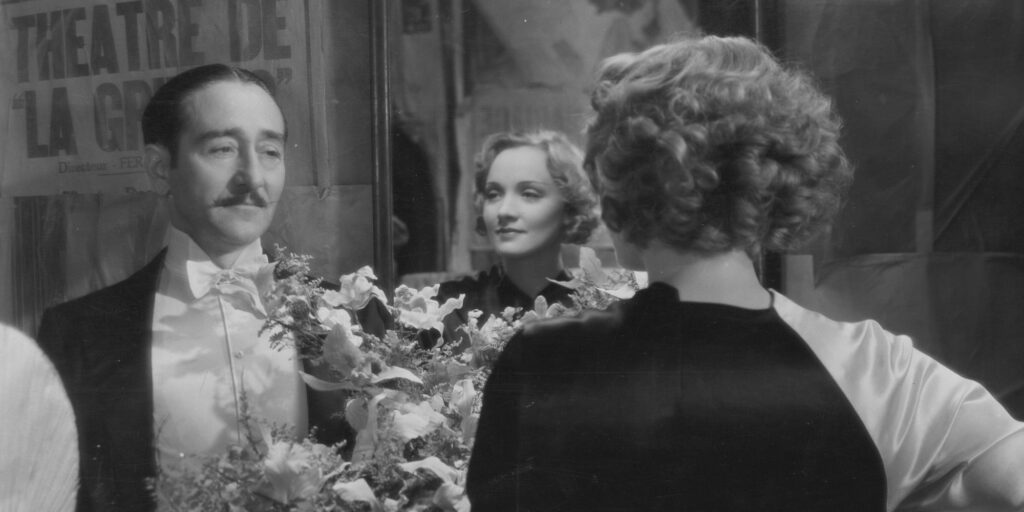MARLENE DIETRICH – CINEMA DISRUPTED

Curated by Deutsche Kinemathek
Marlene Dietrich has been celebrated, debated, photographed and, of course, shown on film to such an extent over the last century that, for many viewers, her first name suffices to introduce her. Notwithstanding all the angles that both history and cameras have taken on her, one thread runs through her work and life. Dietrich did not shy away from disrupting film and society – from challenging conventions in her private life to her show-stopping presence on-screen that interrupts classical narratives to focus all eyes on her and her staging.
Because of Dietrich’s diverse challenges to her audiences, she is now perceived as a role model by different communities: she was provocative as a working mother, as a bisexual star who practised cross-dressing, as a fashion and style icon who created her own image, and as an actress who intervened politically and took a clear stand for freedom, tolerance and democracy. With a selection of her major films, this retrospective therefore explores Dietrich as a disruptive force in cinema history.
Courage and discipline were perhaps Dietrich’s two most important character traits. She courageously fought battles, both in her private and professional life, and stood up for her principles. In the film Morocco, she wore a tuxedo and kissed a woman – making her a queer icon to this day. She wore trousers off-screen at the end of the 1920s and lived out her bisexuality openly. She also showed courage by entertaining the Allied troops during the Second World War and taking a clear stance against Nazi Germany. After the war, she appeared several times in Israel, Russia and Eastern Europe to promote peace and understanding. Her discipline was evident in her relentless work on herself, which was also aimed at shaping and stylising her appearance. Repeatedly labelled “box-office poison”, she constantly reinvented herself. This ambition was paired with a dash of self-aware irony and humour, the famous “Berliner Schnauze”: cheeky, challenging and straightforward, just like many of her film characters.
Dietrich’s performances were also provocative. As a stage entertainer, she was particularly adept at lascivious delays and the art of the pause to heighten the tension, and she used this extraordinary timing in her films. It is precisely her apparent lack of interest that audiences often find challenging. She said of Katharine Hepburn that she was a rare combination of beauty and intelligence, and the same can be said of Dietrich. She was always ready to put her beauty at the service of cinematography, to offer herself up as a projection screen. Because beneath the beautiful surface, the masquerade, lies her intelligence and passion.
Kristina Jaspers
Program
Wednesday 19/06/2024
18:30
Cinema Modernissimo
MARLENE
MARLENE
Wednesday 19/06/2024
21:45
Piazza Maggiore
MOROCCO
MOROCCO
Friday 21/06/2024
16:00
Cinema Modernissimo
MARLENE DIETRICH: HER OWN SONG
MARLENE DIETRICH: HER OWN SONG
Saturday 22/06/2024
11:15
Arlecchino Cinema
CAFÉ ELEKTRIC
CAFÉ ELEKTRIC
Stephen Horne
Sunday 23/06/2024
11:00
Arlecchino Cinema
DER BLAUE ENGEL
DER BLAUE ENGEL
Volker Schlöndorff
Monday 24/06/2024
11:30
Arlecchino Cinema
DIE FRAU, NACH DER MAN SICH SEHNT
DIE FRAU, NACH DER MAN SICH SEHNT
Donald Sosin
Tuesday 25/06/2024
09:00
Arlecchino Cinema
A FOREIGN AFFAIR
A FOREIGN AFFAIR
Tuesday 25/06/2024
11:30
Arlecchino Cinema
SHANGHAI EXPRESS
SHANGHAI EXPRESS
Tuesday 25/06/2024
18:30
Cinema Lumiere - Sala Scorsese
MARLENE
MARLENE
Wednesday 26/06/2024
11:15
Arlecchino Cinema
BLONDE VENUS
BLONDE VENUS
Wednesday 26/06/2024
16:15
Cinema Modernissimo
WITNESS FOR THE PROSECUTION
WITNESS FOR THE PROSECUTION
Paolo Mereghetti.
Thursday 27/06/2024
11:15
Arlecchino Cinema
DESTRY RIDES AGAIN
DESTRY RIDES AGAIN
Thursday 27/06/2024
16:10
Auditorium DAMSLab
Marlene Dietrich: Home Movies
Marlene Dietrich: Home Movies
Presented by Kristina Jaspers (Deutsche Kinemathek)
Friday 28/06/2024
09:15
Arlecchino Cinema
SHANGHAI EXPRESS
SHANGHAI EXPRESS
Friday 28/06/2024
11:00
Arlecchino Cinema
A FOREIGN AFFAIR
A FOREIGN AFFAIR
Kristina Jaspers
Friday 28/06/2024
21:30
Cinema Lumiere - Sala Officinema/Mastroianni
BLONDE VENUS
BLONDE VENUS
Saturday 29/06/2024
11:00
Arlecchino Cinema
TOUCH OF EVIL
TOUCH OF EVIL
Jonathan Rosenbaum
Saturday 29/06/2024
17:30
Europa Cinema
MOROCCO
MOROCCO
Introduction curated by Il Cinema Ritrovato Young


